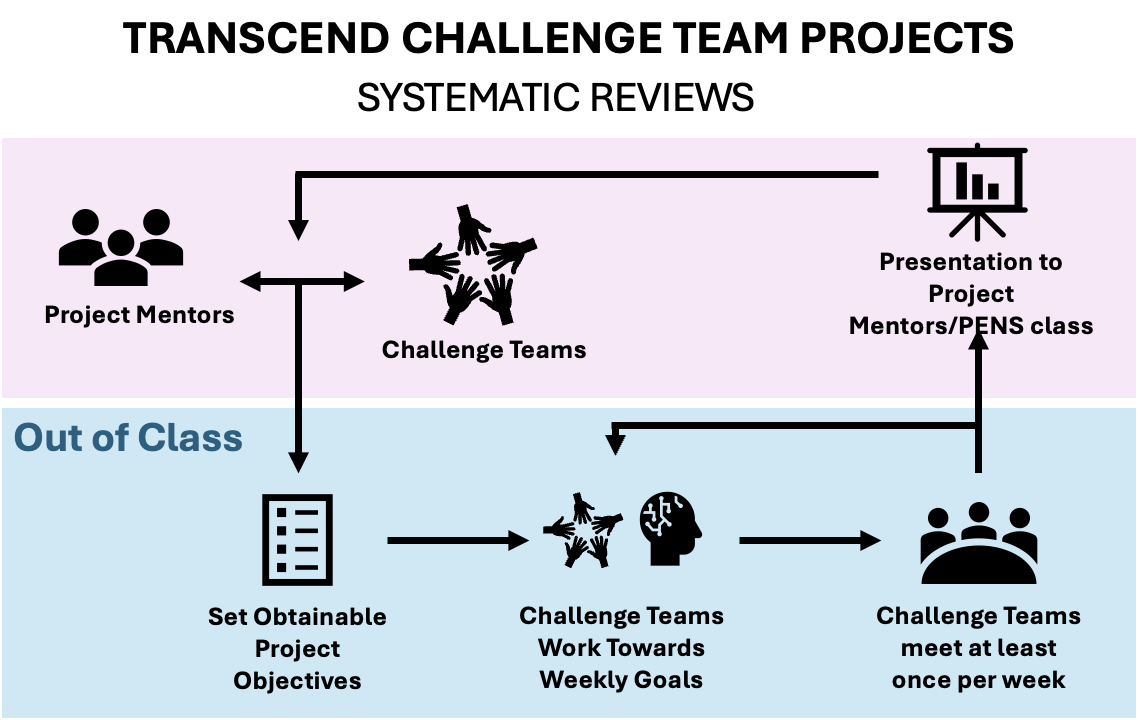Proseminar in Educational Neuroscience (PENS; 6 units over 2 semesters)
- The primary vehicle for learning will be a full-year course, coordinated by TRANSCEND faculty
- This course will have two arms:
- scientific and technical topics, e.g., learning sciences including cognitive neuroscience relevant to education, STEM education, clinical approaches to neurodiversity, technology based assessment and learning tools, and research methods such as neuroimaging, statistics and AI-ML.
- professional development and “soft skills”, e.g., ethics, the open science framework/reproducibility, team science, project management, leadership, teaching/mentoring, communications, outreach, and STEM careers. Leaders and stakeholders from Partner Organizations will be asked to present in their area of expertise or on their personal journeys.
- The primary vehicle for research and team science experience will be the year-long Challenge Team research project built into this course. (see below)

External Workshops
- Trainees will be encouraged to apply to at least one course per year, either on methods (e.g., AFNI bootcamp, Neuromatch Academy, CIME workshop, MSRI, etc.) or management skills (e.g., training as a Team Coach after they complete the 1st year Challenge Team or in Agile project management workshops/training programs designed by Cornell University etc)
- Travel funds are budgeted for all trainees for every year at UConn.
Internships and International Experiences
- We will strongly encourage trainees to take internship opportunities, which provide a critical tool for expanding the STEM workforce in non-academic institutions.
- We have assembled connections to a wide array of 38 partners (12 international), where most have agreed to provide internships.
- Internships will strengthen ongoing and new relationships with industry, NPOs and other sectors.
Community building
- To foster a coherent sense of identity, we will organize regular activities such as social events, mentoring, and tutoring/coaching services!
- All trainees will play a major role on one of the administrative committees, and/or in the organization of Workshops, Talk Shop, and WISHfest (see below), providing opportunities to hone their leadership and project management skills after PENS didactics on relevant topics.
WISHfest
- Each spring, a committee of trainees will organize this outreach event where you will participate in outreach and have the opportunity to present your research to an interdisciplinary group of TRANSCEND and non-TRANSCEND faculty and students, Advisory Committee members, Partner Organizations, as well as community stakeholders, extending the event’s potential impact.
- The event will include a Keynote Speaker, Panel Discussion and Breakout Groups where topics include emergent issues in EdNeuro, neurodiversity, and the STEM workforce.
Talk Shop (BrownBag; 1 unit; weekly)
- Trainees will participate in this weekly series, with a richly interdisciplinary audience of approximately 80 members from Psychology, Education, Computer Science, Engineering, Math, Behavioral Neuroscience, Linguistics, Philosophy, and Speech, Language & Hearing Sciences
- Trainees are required to present at TalkShop at least once a semester.
- This series comprises 30-minute presentations with an emphasis on interdisciplinary communication, followed by vigorous discussion of both research content and communication strategies (i.e., talk mechanics).
-
Workshops
- Workshops are a series of trainee-planned workshops throughout the academic year.
- They identify novel skills and gaps in training, including content areas (e.g., genetics or dynamic systems), specific tools/techniques (e.g., speech or neuroimaging analysis), programming (e.g., Python), ethics (e.g., topics in the Responsible Conduct of Research), and advanced statistics (e.g., mixed effects models in R), etc.
- Hence, these workshops also provide opportunities for leadership, collaboration and teamwork!
-